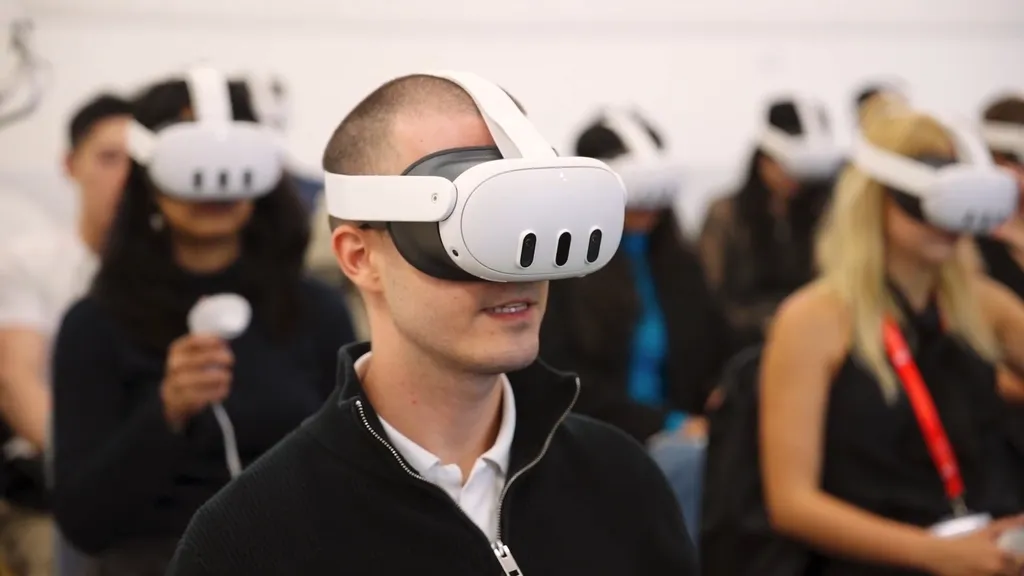Meta for Education has launched in beta to over a dozen universities and colleges in the US & UK.
Meta first teased an education program for Quest headsets in May, though didn't name it at the time. Meta previously said the program will "allow teachers, trainers and administrators to access a range of education-specific apps and features, and make it possible for them to manage multiple Quest devices at once, without the need for each device in a classroom or training environment to be updated and prepared individually".
The offering seems somewhat similar to the Quest for Business platform Meta launched late last year, which allows mass management, updating, and app management of Quest headsets.
Meta for Education seems to include Quest 3, Quest 3S, and Quest 2.
The Meta for Education beta program includes Arizona State University, Houston Community College, Imperial College London, Miami Dade College, Morehouse College, New Mexico State University, San Diego State University, Savannah College of Art & Design, The University of Glasgow, University of Iowa, University of Leeds, University of Miami, and University of Michigan.
Meta says these institutions will provide feedback on the program before its full launch. In its announcement blog post, the company includes a number of quotes from the beta program participants:
“The first time I put on a headset, it was immediately apparent to me that this is not like a screen or TV,” says University of Miami Professor and University XR Initiative Lead Kim Grinfeder. “It had a completely different feeling. We were creating experiences. I immediately recognized this as a tool that’s going to change education—change the way we teach. It allows us to bring the world into the classroom.”
“Students are engaging with the technology in meaningful ways,” notes Houston Community College Reality CoLab Director Rubén Durán. “With our project Virtual Reality for Empathy, we invite in community organizations that are open to all like the Center for the Healing of Racism, and members of the community and HCC students come to the lab and role play to raise awareness and enhance student achievement and experiences that are unknown to the person participating. And this immersion creates emotions in what we think is the initial step to create empathy. The outcomes of this experience are forming part of important research conducted by our psychology faculty.”
“We’re not replacing things that we can do in person, like have dialogues and face-to-face interactions, but we’re exploring things like going into outer space and observing the Earth and the phases of the moon from that perspective, or going underwater or across international boundaries, where in some cases students can’t do that for a variety of reasons, including physical accessibility,” says San Diego State University Senior Director of Instructional Technology Dr. Sean Hauze. “We’re empowering students to do things that would be out of reach otherwise.”
“We’re trying to normalize the use of extended reality,” says University of Miami Associate Director of VR/AR Initiatives Thomas Merrick. “We fully believe that XR is going to be ubiquitous—as ubiquitous as laptops are today. And if not for the students learning about it early on, it won’t be as effective as it could be moving forward.”
“We’ve been very fortunate to beta test a lot of the early prototypes of these programs,” says New Mexico State University Director of Microcredentials Instructional Design Andrew Sedillo. “Meta checks in with us—they’re asking us what they can do to improve the products, and they’re actually listening. And because of that, we’ve developed a lot of trust with Meta because we understand that they’re putting out a product that’s going to impact educators in a positive way.”
“I’m really happy to be pioneering this with Meta and that Meta chose to partner with us and not assume that they had all the answers,” adds Morehouse College Metaversity Director Dr. Muhsinah Morris. “I think Meta has all of the tools that they need, and allowing us to beta test is giving you better insight on how to make the product better for us. And that will help it be more widely adopted: People will know that it was built with educators that are just like them, that you cared enough to take our input in, and that you heard us and listened and iteratively changed because of it.”
“This moment is greater than any one institution or one company. We need to come together in collaboration across the creators, the developers, educational institutions, research organizations, and tech companies to build this new learning ecosystem because it’s going to benefit every individual and industry," says Monica Arés, Executive Director of Imperial IDEA Lab, Imperial College London. “We’re finally at a place where we have a way to combine the digital and physical worlds, and it’s unlocking this entirely new set of tools, which is what makes all of this so exciting.”
Meta says it will make Meta for Education available "more widely this winter", suggesting the public launch could be just a few months away.






























